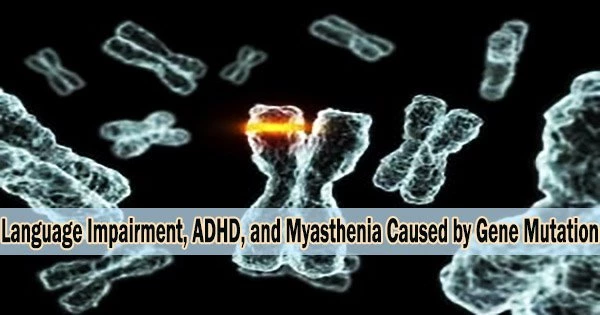According to two research, some CAPRIN1 gene abnormalities have serious ramifications for people. First, the study group demonstrated that developmental disparities, such as autism spectrum diseases, attention deficit hyperactivity disorder (ADHD), and language difficulties, can be brought on by insufficient production of the protein CAPRIN1 in the brain.
Additionally, the researchers discovered a particular mutation in the CAPRIN1 gene (CAPRIN1P512L) that results in an aberrant protein buildup, resulting in a shaky stride and muscle weakness (myasthenia). The two findings were printed in the journals Cellular and Molecular Life Sciences and Brain, respectively.
Exome analysis, which allow researchers to see which genes are changed in a cell, enabled these fresh perceptions. The group also made use of the GeneMatcher database, a resource where scientists and medical professionals can communicate about gene variations and the diseases they are related with.
The research team identified twelve patients who had mutations in the CAPRIN1 gene. In them, only half of the amount of protein was produced. Lisa Pavinato, a doctoral researcher in the team of Professor Dr. Alfredo Brusco at the University of Turin and DAAD-scholarship holder with Professor Dr. Brunhilde Wirth at the University of Cologne, discovered a connection between the deficient production of the protein and certain neurological impairments.
The new research results are important not only for the affected patients and their families, who often spend years searching for answers to understand the cause of their disease, but also for physicians, who can now make faster and more accurate diagnoses.
Professor Dr. Brunhilde Wirth
All of the affected individuals suffered from speech difficulties, 82% had ADHD, and 67% had autism spectrum disorders or other neurodevelopmental abnormalities. In lab tests utilizing human induced pluripotent stem cells, the CAPRIN1 gene was turned off using the CRISPR/Cas9 technology, simulating the symptoms that the affected people experienced. This verified the function of CAPRIN1.
Compared to the healthy neurons without the mutation, cells with a CAPRIN1 mutation generate shorter processes and defective circuits that exhibit decreased electrical activity. Contrarily, control neurons devoid of the CAPRIN1 mutation grow into intricate networks by forming protracted processes.
As one of the most crucial cellular processes for error-free cell production and function, the scientists also found abnormalities in translation. In fact, after a few days, the mutant neurons started to deteriorate and form clumps as a result of the flawed translation.
The results of this research have been published in the article ‘CAPRIN1 haploinsufficiency causes a neurodevelopmental disorder with language impairment, ADHD and ASD’ in Brain.
In the second investigation, three children from various families were found to have a newly discovered point mutation at the CAPRIN1 gene, which is an amino acid swap from proline to leucine at position 512.
The three kids all exhibit the same signs of early-onset myasthenia, dysarthria, impaired speech motor abilities, and ataxia (movement problems). Doctoral student Andrea della Vedove in Professor Wirth’s lab demonstrated that this particular mutation results in many protein clumps in neuronal cells, which are similar to other neurodegenerative illnesses like Parkinson’s, Alzheimer’s, or ataxia.
In addition, the activity of the nerve cells was reduced. The study ‘CAPRIN1P512L causes aberrant protein aggregation and associates with early-onset ataxia’ has appeared in Cellular and Molecular Life Sciences.
“The new research results are important not only for the affected patients and their families, who often spend years searching for answers to understand the cause of their disease, but also for physicians, who can now make faster and more accurate diagnoses,” said Professor Dr. Brunhilde Wirth, Director of the Institute of Human Genetics at University Hospital Cologne, who led the studies together with national and international teams.
















